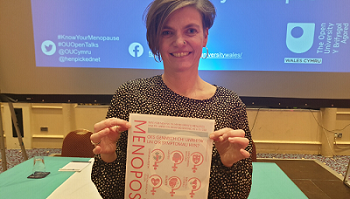Ten things we learnt from ‘Let’s talk about menopause’

‘Let’s talk about menopause’ was a free event organised as part of the OU in Wales’ OpenTalks series and held in partnership with Henpicked. The discussion in Cardiff encouraged conversation around menopause, including ways that employers could support colleagues going through menopause and the different medical, diet, holistic, and lifestyle interventions available for those experiencing menopausal symptoms.
Guests heard from Professor Jo Brewis, from OUBS, Julie Glyn-Jones, a registered nurse and trainer for Henpicked, and Lynnette Thomas, Deputy Director of the OU in Wales. Those who came along to the event or watched online had the opportunity to ask their own questions in a live Q&A with our panel of speakers.
Here are ten things we learnt from ‘Let’s talk about menopause’, and some free resources if you’re experiencing menopausal symptoms or are an employer looking to support colleagues going through menopause.
1.
Menopause is a mid-life experience in general. The average age when women start experiencing menopausal symptoms is 48. However, 1 in 100 women go through what is called ‘early’ or ‘premature’ menopause which, clinically speaking, affects women below the age of 40 years old.
Professor Jo Brewis
OUBS
2.
Menopause is often regarded as a private, even taboo, subject and one which has nothing to do with employment. However, there are four very good reasons why employers need to pay careful attention to the menopause: the demographic, economic, legal and social responsibility cases.
Professor Jo Brewis
OUBS
3.
Women aged between 50 and 64 are the fastest growing demographic group in the workplace in the UK and right across the north of the globe.
Professor Jo Brewis
OUBS
4.
It’s really important to remember that not everyone who goes through menopause identifies as a cis woman. There are many women who identify as trans men, gender fluid, or non-binary, who still biologically experience menopause.
Professor Jo Brewis
OUBS
5.
50% of women going through menopause said that work was making their symptoms worse. 25% said they had seriously considered quitting work altogether.
Professor Jo Brewis
OUBS
6.
The biggest gender pay gap is between men and women in their 50’s which is the period in which women are most likely to be experiencing menopausal symptoms.
Professor Jo Brewis
OUBS
7.
60% of OU students in Wales identify as female. 63% of these women are in full or part-time work.
Lynnette Thomas
Deputy Director of The Open University in Wales
8.
There are around 34 symptoms of menopause. These tend to be split into two categories: physical and psychological. The hormone oestrogen, which is affected by menopause, has over 300 functions in the body, so you see how far reaching symptoms can be.
Julie Glyn-Jones
Henpicked
9.
75% of women going through menopause experience symptoms. 25% of these have serious symptoms – the kind that make you leave your job, or cause your relationship to break down, the kind that have a debilitating effect on your life.
Julie Glyn-Jones
Henpicked
10.
A third of women don’t think their symptoms are bad enough to start Hormone Replacement Therapy (HRT). However, as soon as you start noticing symptoms you can begin treatment. For the majority of women under 60 years, HRT is low risk and can help relieve symptoms.
Julie Glyn-Jones
Henpicked
Free Resources
- Watch the live recording of the ‘Let’s talk about menopause’ OpenTalk
- Visit Henpicked – one of the UK's largest, fastest growing communities for women over 40
- Menopause at work – Henpicked’s free resources for employers and employees
- Learn more about Professor Jo Brewis’ work and research for The Open University Business School
- Pausitivity's #KnowYourMenopause Poster Campaign
